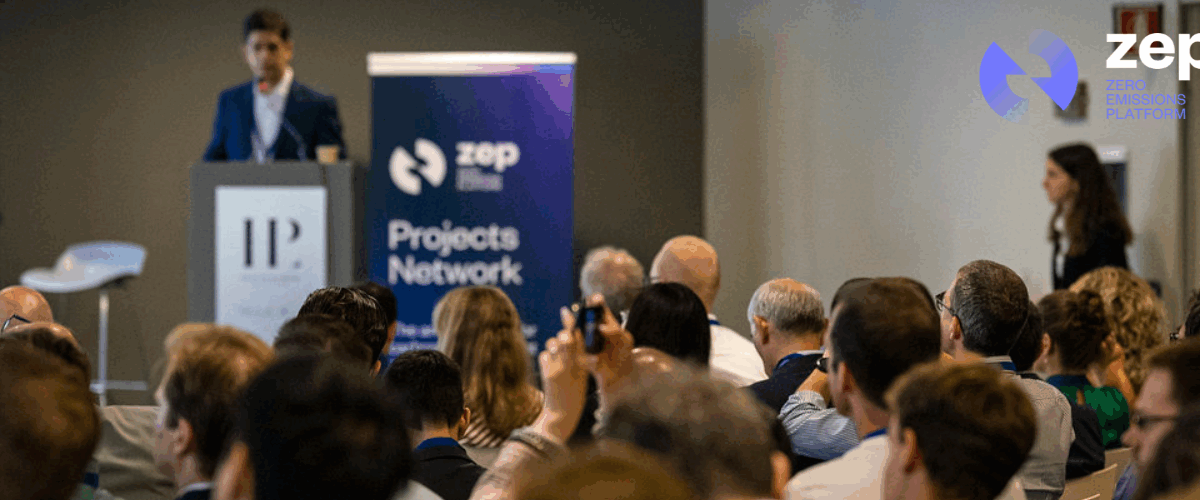5 insights from the ZEP Projects Network 2025
Last month, we hosted our annual Projects Network event in partnership with the Ravenna CCS Projects, and co-hosted by Eni and Snam. This year’s edition brought together 220 participants from around Europe to Bologna, Italy. Over two days, stakeholders from the industrial carbon management community shared insights on the trends shaping industrial carbon management technologies, such as carbon capture and storage (CCS) and carbon capture and utilisation (CCU), in the region. Here are five insights to remember from the ZEP Projects Network 2025.
1. Ravenna puts Southern Europe on the CCS map
As outlined in the Net Zero Industry Act, making CO₂ storage capacity available across the EU is essential to delivering Europe’s clean industrial strategy. While projects are advancing to meet the EU target of 50 million tonnes of annual injection capacity by 2030, most of Europe’s storage capacity is concentrated in the North Sea.
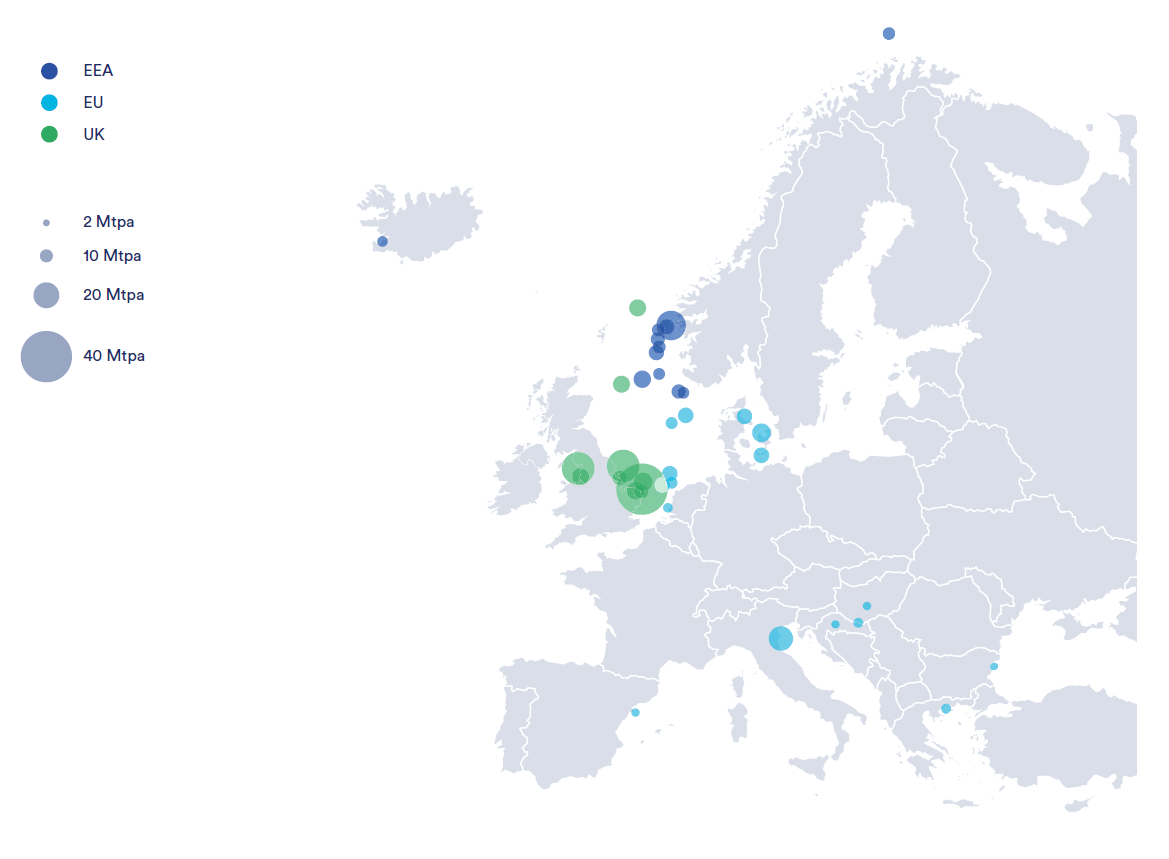
Northern Europe’s leadership has made it the default reference point in many CCS discussions. But Southern Europe is also actively developing CO2 infrastructures of its own. Ravenna CCS, Italy’s first large-scale CCS project, is putting the region firmly on the map.
Ravenna CCS: a Mediterranean CCS hub?
Phase 1 of Ravenna CCS began in Q3 2024, with the injection of up to 25,000 tonnes of CO₂ per year captured from the Casalborsetti gas treatment plant. The project infrastructure is designed to receive CO₂ from multiple modes of transport (pipeline, ship, truck, and train), making the hub accessible and adaptable for a wide range of emitters.
The CO₂ is permanently stored in offshore depleted gas fields in the Adriatic Sea, with an estimated storage potential of 500 million tonnes. This positions Ravenna not only as a milestone for Italy’s industrial decarbonisation but also as a potential regional hub serving emitters across the Mediterranean.
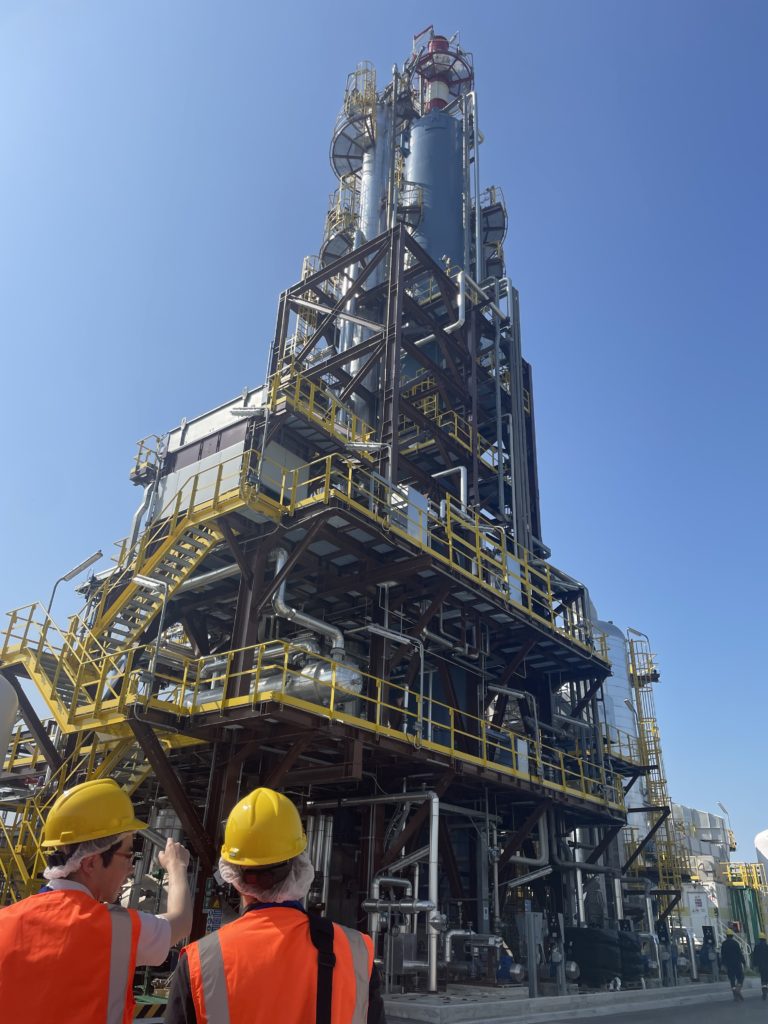
2. CCS moves from PowerPoint to practice
Throughout the conference, project developers and infrastructure users shared practical insights from ongoing projects, covering pipeline design, transport, storage, and monitoring systems. This highlighted how CCS is seen as a pillar of industrial decarbonisation in Europe.
A virtuous example from the cement sector: Heidelberg Materials’ DREAM Project
A standout example came from Heidelberg Materials (HM)’ DREAM Project (Decarbonisation of Rezzatto And Mazzano Cement Plant). They detailed how the project contributes to achieving net zero by 2050, with the intermediate HM’s global target of reducing specific net CO₂ emissions to below 400kg per tonne of cementitious material by 2030.
The DREAM Project will deploy a CCS solution at the Rezzato-Mazzano plant in Brescia, capturing CO₂ from both grey and white clinker production lines. DREAM will demonstrate the first commercially viable and de-risked CCS value chain for the cement sector in Italy. As a pioneer, Heidelberg Materials is also accelerating the progress of the Eni-Snam Ravenna CCS project.
Aiming to deliver the first carbon-captured cement in both production lines in Italy, DREAM exemplifies how CCS is moving beyond theory and becoming an integral part of real-world operations in the cement sector. As with all capital-intensive projects such as DREAM, the support of national and international incentives is essential for successful implementation.
3. CCS is now recognised as a cornerstone climate solution at local, national, and international levels
Recent EU policy developments, including the proposed 2040 climate target, the Net-Zero Industry Act, and increased funding through the Innovation Fund, underscore that CCS has established itself as an essential climate solution.
Representatives from the European Commission’s DG CLIMA joined the ZEP Projects Network to highlight the critical role of industrial carbon management within the broader Clean Industrial Deal agenda. Complementing this policy momentum, the European Investment Bank (EIB) shared how it is financing CCS projects across Europe, as part of its mission of accelerating green investments and unlocking private capital to drive industrial decarbonisation.
From a national perspective, Italy’s Ministry of the Environment and Energy Security presented the country’s emerging CCS strategy. Italy’s updated National Energy and Climate Plan (NECP) 2024 sets an indicative target of capturing and storing 4 million tonnes of CO₂ annually by 2030, signaling CCS as a vital tool for decarbonising hard-to-abate sectors. The Ministry reaffirmed CCS as a key lever for Italy’s pathway to net-zero emissions by 2050.
Support for CCS also came at the regional level. The Emilia-Romagna Regional Authority’s Vice-President for Economic Development and Green Economy officially welcomed the Projects Network, highlighting Ravenna’s CCS project as a cornerstone of the region’s green transition and a strategic asset for building a sustainable local economy.
4. Political will and public trust are decisive enablers
While making projects operational requires exceptional technical and financial capacity, the ZEP Projects Network made clear that political leadership and public support are equally important. In a live poll conducted during the event, over 50% of participants identified political will as the most critical enabler for expanding CCS rapidly and at scale. Strong political backing not only drives policy and funding decisions but also enhances the credibility of CCS in the eyes of the public and investors.
Governments are ramping up capacity on CO2 storage permitting
A panel discussion, convened with the support of Bellona Europa and moderated by their expert Tom Mikunda, brought together government representatives from Germany and Romania. The discussion highlighted that action is underway in their respective competent authorities to boost technical capacity for handling CO2 storage permit applications. Given that German and Romanian-based oil and gas operators have sizeable obligations under the EU’s Net Zero Industry Act’s injection capacity targets, this is a necessary and positive development.
Besides, discussions underscored the importance of knowledge sharing between governments, particularly between Member States with more experience in permitting, such as the Netherlands and Denmark, and Member States in which storage activities are at an earlier stage of development.
Ensuring the local public is supportive of a project is also critical. Throughout the conference, government officials from Denmark, Romania, and Germany, as well as civil society representatives, shared best practices for building trust and fostering transparent dialogue with local communities.
Gaining local buy-in: Denmark’s pioneering effort to develop onshore CO2 storage
Since 2020, Denmark has established itself as a pioneer in advancing CO2 storage development in the EU, especially onshore. Denmark’s experience shows how transparency, early involvement, and consistent, accessible communication can mitigate skepticism and build informed support.
Key best practices of efforts to advance onshore storage include:
- Recognising the role of local context: skepticism may stem from past experiences or broader concerns, not necessarily related to the project or CO2 storage itself. Developing close relationships with local communities and having local champions is essential to getting off on the right foot.
- Avoiding assumptions: Most people have no knowledge or opinions about CO2 storage or industrial carbon management. Starting with an open mind and being clear about risks and risk management is critical to building trust.
- Using accessible language: While involving scientists and researchers can significantly help with building trust, keeping descriptions about CCS and CO2 storage clear and jargon-free is very important to building understanding.
- Building iteratively: The most important point is to start from where people are, gather feedback, and adapt as engagement deepens. Projects take years to develop, so it is important that time is spent in building trust and being consistent with engagement as the project progresses.
5. Closing the funding gap is a top priority
Securing sufficient funding remains a major challenge to deployment. 75% of our participants identified financing investment costs as the most significant barrier facing their CCS project. In contrast, issues such as cross-border transport, staffing, or value chain partnerships were seen as far less constraining.
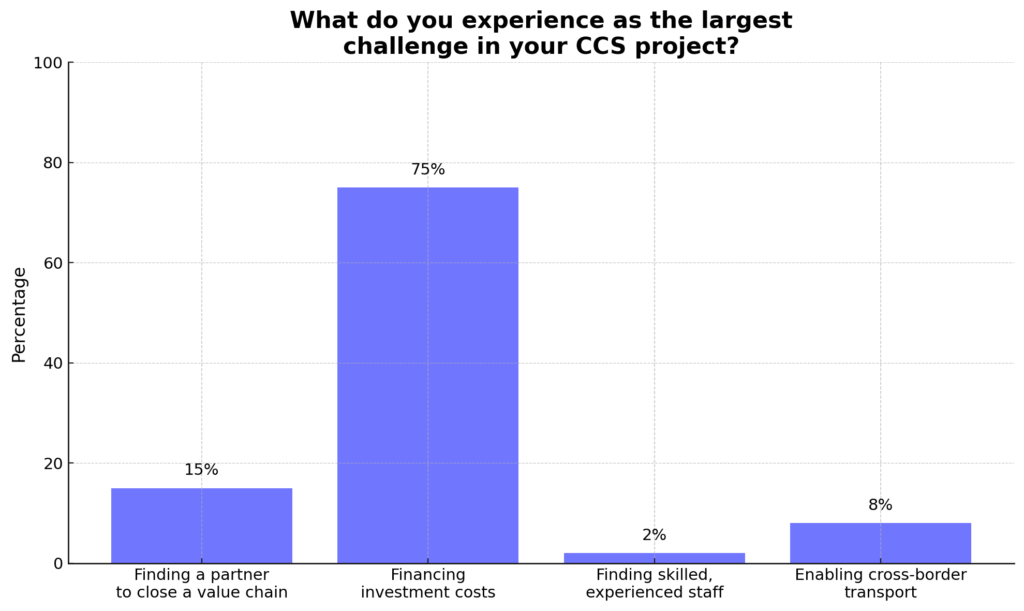
Throughout the event, financial experts shared how they are working to bridge the funding gap: structuring bankable projects, securing equity and debt financing, and de-risking investments to attract capital into industrial carbon management.
Contracts for Difference emerge as a key funding instrument
Our live survey also explored which types of funding instruments are considered most appropriate by project developers. Contracts for Difference (CfDs) stood out as a fundamental mechanism to provide some long-term revenue certainty and help reduce investment risk for emitters and infrastructure developers.
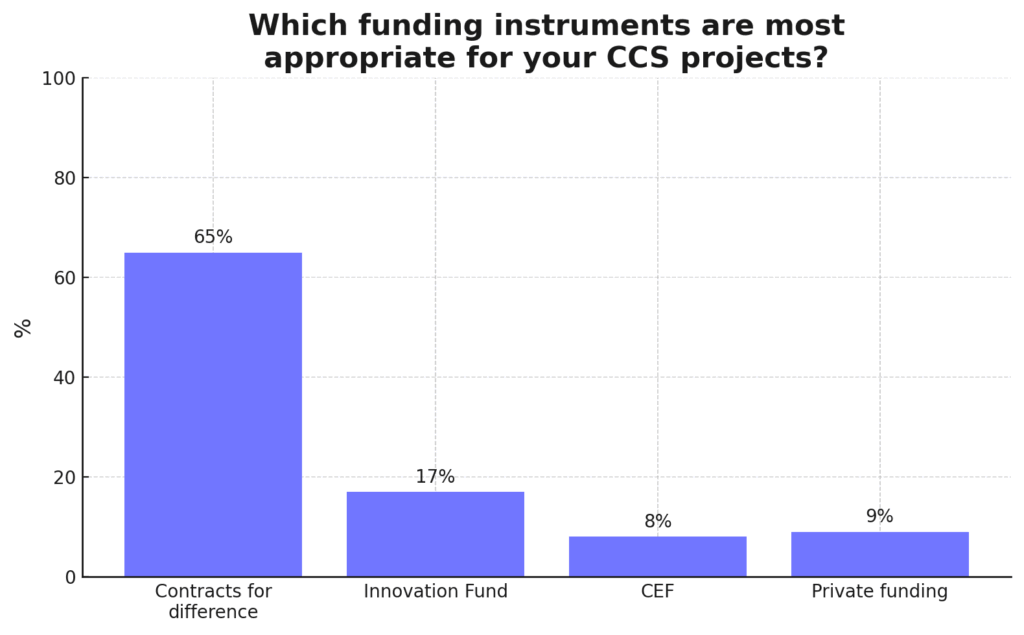
Bonus insight: Industrial carbon management is built through collaboration
The level of detail shared by CCS developers and infrastructure users during the conference reflects not only the maturity of the Ravenna project but also the growing momentum across Europe toward CCS as a pillar of industrial decarbonisation. As projects like Ravenna show what is technically and commercially possible, the conversation is shifting from theoretical potential to practical necessity.
Meanwhile, the conference emphasised that the successful deployment of CCS depends on strong coordination among all stakeholders involved in industrial carbon management (ICM), including infrastructure users, developers, financiers, policymakers, and civil society.
ZEP continues to serve as a trusted platform where stakeholders identify enablers, tackle barriers, and accelerate deployment. Do not miss the next milestone: the European Industrial Carbon Management Summit this autumn. Click here to stay informed.
ZEP extends its sincere thanks to the event’s sponsors: Heidelberg Materials (lead sponsor), Mitsubishi Heavy Industries (Contributing sponsor), KNCC (Associate sponsor), and Bellona Europa (Supporter).
Authors
Amélie Trémolières is the Communications Manager at ZEP, where she leads the organisation’s communications strategy across institutional communications, policy communications, events, and media relations. She ensures ZEP’s work on climate policy and carbon management technologies is clearly framed, visible, and reaches the right audiences to support ZEP’s objectives.
Before joining ZEP, she worked in several European policy environments, including think tanks such as the Centre for European Policy Studies, government institutions including the French Consulate, and the General Secretariat of the Council of the EU as a digital communications trainee. She also spent two years as Communications and Events Operations Lead at a Brussels-based European association.
She has expertise in media relations, social media strategy, website management, and branding. Amélie holds an academic background in EU studies and political and public communication, is a native French speaker, and has a strong interest in climate and EU policy.
Iria supports ZEP’s work by building and strengthening relationships with partners, supporting the organisation’s membership community, and fostering collaboration and engagement across stakeholders within the ZEP ecosystem.
Before joining ZEP, Iria worked as a Project Manager in POLITICO Europe’s Live division. She has also supported Flanders Investment & Trade and worked in consultancy. She has a background in law and global governance, with further studies in global management and economic diplomacy.
Outside of work, Iria enjoys live music, learning new languages, discovering under-the-radar coffee spots around the city, staying up to date with current affairs, and spending time with friends and family.
